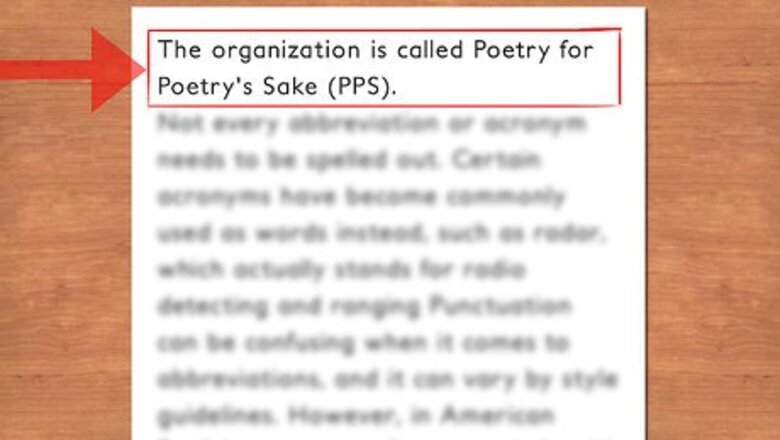
views
Understanding Abbreviations in Professional Writing
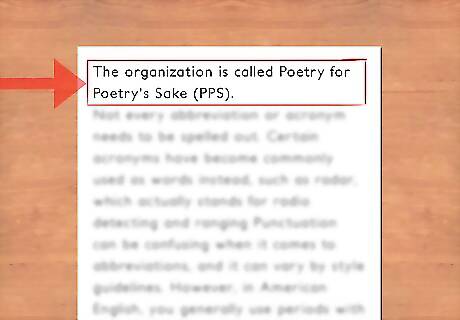
Define the abbreviation the first time you use it. In formal writing, you must always spell out the abbreviation the first time you use it. Generally, you follow the full name with the abbreviation in parenthesis. For instance, if you are using the abbreviation for an organization, you would spell out the name first: "The organization is called Poetry for Poetry's Sake (PPS)." Not every abbreviation or acronym needs to be spelled out. Certain acronyms have become commonly used as words instead, such as "radar," which actually stands for "radio detecting and ranging."
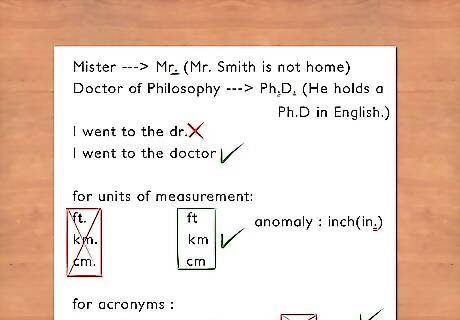
Understand the punctuation. Punctuation can be confusing when it comes to abbreviations, and it can vary by style guidelines. However, in American English, you generally use periods with abbreviations such as honorifics (titles for people) and street name abbreviations. For instance, you use a period when you abbreviate "Mister" to "Mr." or when you add "Ph.D." after someone's name to show she has a doctorate. Don't abbreviate a person's title if it's not in front of her name. For instance, you wouldn't say, "I went to the dr.," but rather "I went to the doctor." However, you can abbreviate things like "Ph.D." when it's not after a person's name. You abbreviate "Street" to "St." or "Terrace" to "Ter." You can find a list of standard street abbreviations from the Post Office. Don't use periods with units of measure, such as "ft" or "km." Don't use periods with acronyms, such as the one used above: Poetry for Poetry's Sake should be abbreviated "PPS" not "P.P.S."
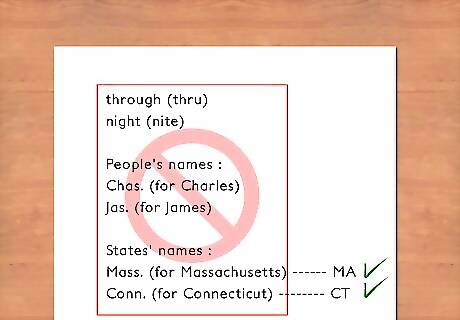
Spell out certain words. For instance, don't abbreviate class names or state names in most formal writing, though this rule also depends on what style guidelines you're using. (AP Style, for instance, has its own rules about abbreviating state names). Also, don't shorten regular words, such as "your" to "yr" or "through" to "thru" in formal writing.
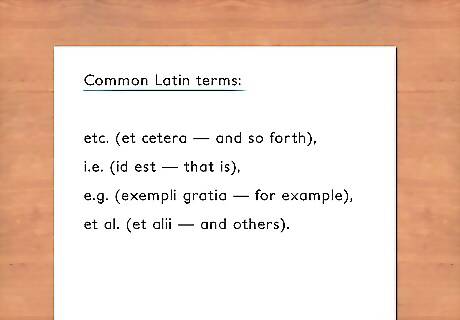
Use Latin abbreviations when appropriate. You can use some abbreviations derived from Latin. Some style guidelines prefer you leave some of them out; check to make sure it's appropriate for what you're writing by checking the style guidelines for that piece. For example: use "etc." for et cetera, meaning "and so forth" use "et al." for "et alii" or "and others" use "i.e." for "id est" or "that is" use "e.g." for exemplī gratia or "for example."
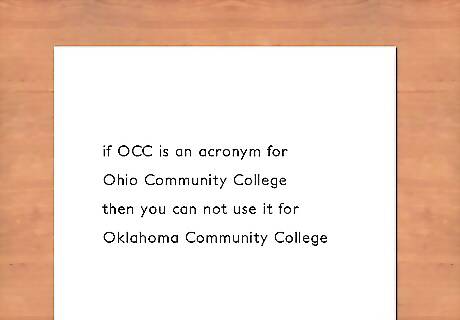
Don't duplicate acronyms. In other words, if you use "OCC" for an acronym for Ohio Community College, you shouldn't also try to use it for Oklahoma Community College. If you double up, you'll only confuse readers.
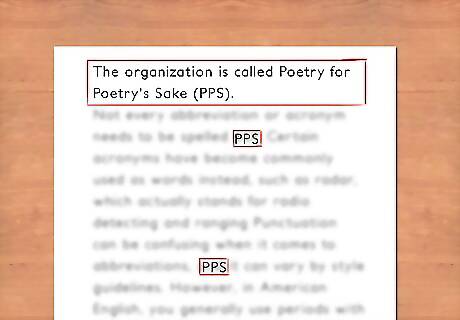
Be consistent. As stated, each style guidelines will require you to use abbreviations slightly differently. However, one of the most important rules of abbreviations is to be consistent. Once you choose an abbreviation, make sure you write it the same way throughout the document. For instance, if you choose to use the acronym "PPS" for the organization "Poetry for Poetry's Sake," don't suddenly change to "PFPS" partway through the paper.
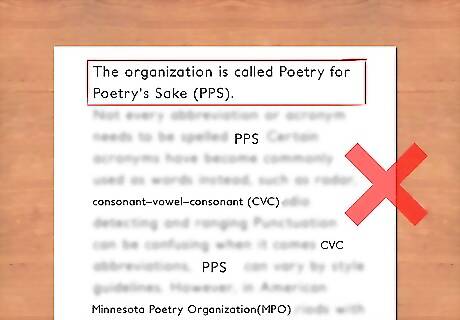
Don't overuse abbreviations. Even if you define abbreviations the first time you use them, having too many in one text can confuse readers. For instance, don't try to abbreviate certain terms, such as "subject" or "object" in academic paper just because you use them often. Stick to acronyms for organization names and standard abbreviations that most people know.
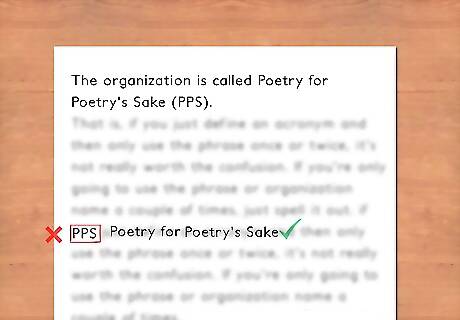
Save acronyms and abbreviations for repeat offenders. That is, if you just define an acronym and then only use the phrase once or twice, it's not really worth the confusion. If you're only going to use the phrase or organization name a couple of times, just spell it out.
Using Abbreviations Online and on Smartphones
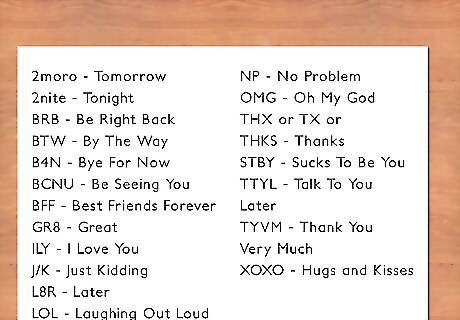
Follow the crowd. While generally it may seem like textspeak online and on smartphones is all about breaking the rules, in many ways it's as formalized as abbreviations in other forms. That is, through widespread use overtime, certain abbreviations have come to be considered standard. "Textspeak" just refers to the language and spelling that has developed since the advent of texting. For instance, a common acronym online is "LOL," meaning "laughing out loud," to show amusement, although some people use "haha" instead. Capitalizing "LOL" has become optional; some people may use "lol" instead. If you're unsure what abbreviations to use, you can find any number of abbreviation dictionaries online that give definitions for textspeak, such as on Webopedia.

Understand language is fluid. Just like in everyday language, certain groups will deviate from the norm or use their own set of jargon abbreviations. In fact, online text often deviates from texting abbreviations, as people tend to use fewer abbreviations online. Sites like Twitter are the exception, as it restricts the number of characters a person can use per tweet.

Make your own rules. Though it's good to use acronyms and abbreviations when they already exist, textspeak tends to change as it needs. That is, as long as the other person can understand what you are saying, you can shorten words, replace complicated spellings with simple spellings, and make your own contractions. You can also leave out vowels.

Know when to drop the textspeak. Nonetheless, textspeak has its limits. Whenever you're communicating with a colleague, your boss, or even just someone who's a bit older, it's probably a good idea to drop the textspeak and use regular spellings. Older generations tend to frown on this type of texting, though that's not true across the board. Regardless, it's best to keep it out of professional and work settings, with the exception of like-minded peers. If you are writing a business email or other formal correspondence, do not abbreviate. Use full words and formal, clear language.




















Comments
0 comment